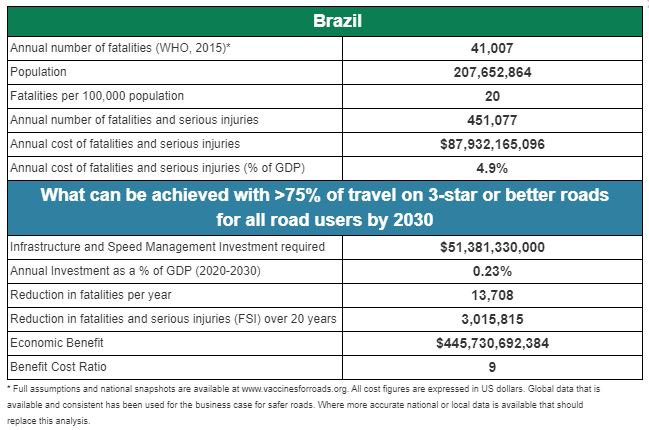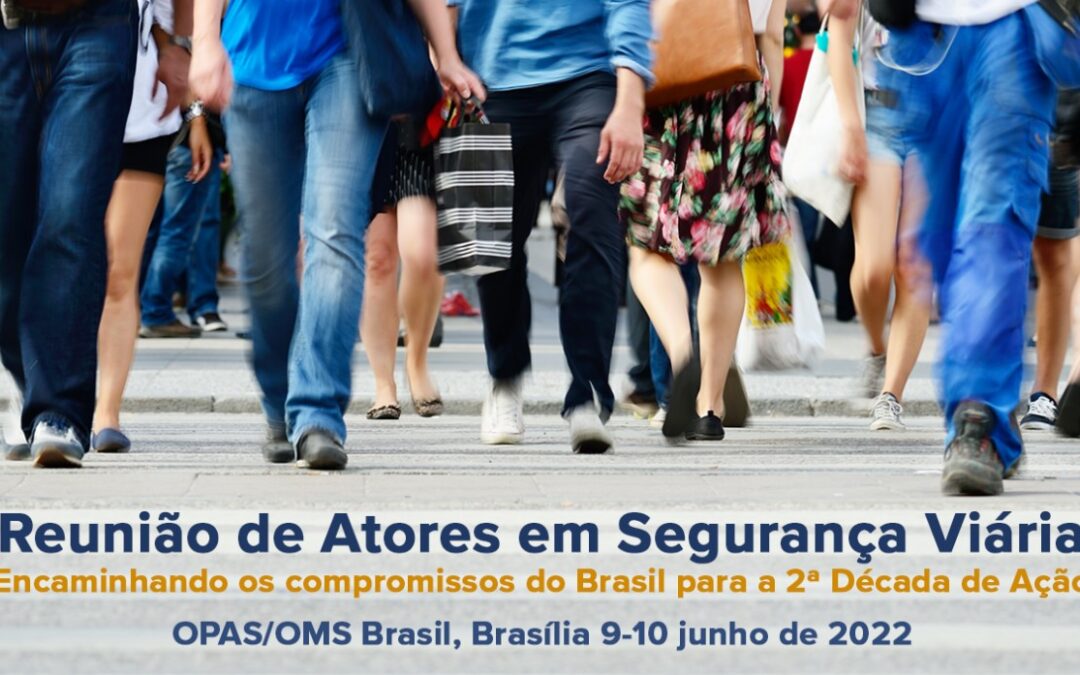We are pleased to join this week’s Road Safety Actors Meeting in Brazil, a pre-meeting on national efforts ahead of the UN High-Level Meeting for Road Safety to be held in New York from 30 June to 1 July.
The Road Safety Actors Meeting, promoted by the Pan American Health Organization/World Health Organization (PAHO/WHO) office in Brazil and partners at PAHO headquarters in Brasília-DF, will promote a discussion on the challenges and potential for road safety in Brazil in the Decade of Action for Road Safety 2021-2030.
The Meeting will be held online from 0900 to 1700 hours Brasilia time on 9 and 10 June.
Sessions will be broadcast on PAHO TV at http://www.youtube.com/PAHOTV in Portuguese, English and with interpreters in Brazilian Sign Language – Libras.
EVENT PROGRAMME
iRAP Star Rating for Schools Coordinator Rafaela Machado will present on Friday 10 June in the “Road Infrastructure and Land Use Planning” Panel Session from 0900 – 1000 hours. The full programme includes:
Thursday 9 June
0900 – 0945 Opening Ceremony
0945 – 0950 Meeting objectives and outcomes
Victor Pavarino, Pan American Health Organization/World Health Organization (PAHO/WHO) office in Brazil
0950 – 1000 Global Plan for the Decade of Action for Road Safety 2021-2030
Matts-Åke Belin, Global Lead, Decade of Action for Road Safety, World Health Organization
1000 – 1030 Coffee break
1030 – 1130 PANEL 1: PNATRANS and DANT Plan: Coordination and management of Brazilian road safety programmatic frameworks for the Decade
Moderator: J. Pedro Correa, JPC Communication
Frederico de Moura Carneiro, National Secretary of Traffic, SENATRAN/ MInfra
Arnaldo Correia de Medeiros, Secretary of Surveillance, Ministry of Health
Matts-Åke Belin, Global Lead, Decade of Action for Road Safety, World Health Organization
Rebeca Bavinger, Public Health Program Officer, Bloomberg Philanthropies
1135 – 1220 Good Practices 1: Adopting the safe systems approach in a Municipal Road Safety Plan: The Fortaleza case
Eduardo A. de Aquino, Traffic Director, Fortaleza Traffic Authority (AMC)
1220 – 1400 Lunch break
1400 – 1500 PANEL 2: Speed Management
Moderator: Michelle Andrade, Transport Post-Graduation Program. University of Brasilia
Bruno Rizzon, Road Safety Analist, WRI Brasil
Eduardo Pompeo Martins, Project Manager, Global Designing Cities Initiative – GDCI
Ingrid Luiza Neto, Researcher in Environmental Psychology
Juan Miguel Velásquez Torres, Transport Specialist, GRSF/World Bank
1505 – 1540 Good Practices 2: Strengthening road safety enforcement: The State of Para experience with the ECLAC/UN Road Safety Fund)
Renata Mirella Freitas Guimarães de Sousa Coelho, General Director DETRAN-PA
1545 – 1645 PANEL 3: Data Management
Moderator: Giovanny V. A. de França, Director of the Dep. of Health Analysis and Surveillance, Brazil’s Ministry of Health
Eduardo Sanches Faria, Director of the Traffic Policy Management Department – DGPT, National Traffic Secretariat – SENATRAN/MInfra
Patrícia P. Vasconcelos de Oliveira, General Coordinator for Surveillance of Non-Communicable Diseases and Injuries, Brazil’s Ministry of Health
Carlos Vinícius Reis, Official for Strategic Management, Technology and Innovation at the Ministry of Infrastructure.
Marli Souza Rocha, General Coordinator of Information and Epidemiological Analysis at the Health Surveillance Secretariat, Brazil’s Ministry of Health
Otaliba Libânio de Morais Neto, Department of Public Health, IPTSP/University of Goias
1645 – 1700 Summary of the day
Friday 10 June
0900 – 1000 PANEL 04: Road Infrastructure and Land Use Planning
Moderator: Paula Manoela dos Santos, Active mobility Manager, WRI Brazil
José Rafael Neto, Development Bank of Latin America
Rafaela Machado, SR4S Global, International Road Assessment Programme (iRAP) Program Coordinator
Paulo Roberto Guimarães Jr., Secretary of Urban Mobility, City of S.J. dos Campos
1010 – 1100 Good Practices 3: Bloomberg Initiative for Global Road Safety in Brazil
Dante Rosado, Vital Strategies
1100 – 1120 Coffee break
1120 – 1220 PANEL 5: Motorcycles: challenges and opportunities
Moderator: David Duarte Lima, Faculty of Medical Sciences, University of Brasilia
Antônio A. Monteiro de Souza, Road Safety Specialist
Luiz Carlos Mantovani Néspoli, Superintendent of the National Association of Public Transport – ANTP
Carlos Alberto Guglielmi Eid, Brazilian Traffic Medicine Association – ABRAMET
1220 – 1400 Lunch break
1400 – 1500 PANEL 6: Transport Planning and Inclusion: mobility, gender, and race
Moderator: Akemi Kamimura, Human Rights NPO, Pan American Health Organization PAHO/WHO Brazil
Nhan Tran, Head of the Unit of Safety and Mobility, Department of the Social Determinants of Health – World Health Organization
Paulo Henrique (Paíque) da Silva Santarém, Anthropologist, Architecture and Urbanism PhD Candidate
Glaucia Pereira, Multiplicidade Institute Reseracher on Urban Mobility
Adriana Cristina da Silva Souza, Urban Mobility Specialist
High-risk roads are being eliminated in Brazil thanks to the BrazilRAP Programme, hosted by the National Department of Transport Infrastructure (DNIT).
DNIT was recently awarded an iRAP 5-Star Performer International Award for establishing BrazilRAP. The Award recognises DNIT’s exceptional leadership in the successful creation of the BrazilRAP programme as well as its outstanding efforts to build local capacity and apply the iRAP methodology extensively on Brazil´s federal roads. Read more on this here.
According to iRAP’s Vaccines for Roads Big Data Tool, achieving greater than 75% of travel roads on 3-star or better roads for all road users by 2030 in Brazil would save over 13,700 fatalities a year with an economic benefit of $9 for every $1 spent.

The UN High-level Meeting for Road Safety later this month will bring together Heads of State of UN member countries with the theme “2030 Horizon for Road Safety: Securing a Decade of Action and Delivery” and reflects the UN Sustainable Development Goal to halve road deaths and injuries by 2030. It aims to address gaps and challenges, mobilize political leadership, promote multi-sectoral and multi-stakeholder collaboration, and assess the progress made in attaining the objectives of the road safety-related SDG targets.
Read more on the UN High-Level Meeting here.

















